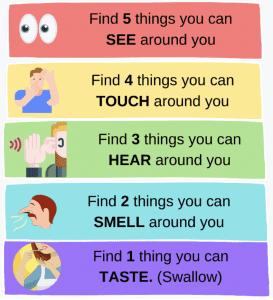Here at SMSI, we aim to support students as they balance the highs and the lows of college life. While college is filled with many rewarding and unique experiences, we recognize that studying has the potential to impact stress and mental health. Research shows us that when we are engaging in studying, we are in fact experiencing spikes in the stress hormone cortisol (Schoofs et al., 2008). However, this does not have to be a bad thing! In fact, experiencing stress which is manageable (e.g. eustress) can better enable us to perform tasks, focus, find flow and succeed in our ventures (Li et al., 2016).
Strategies for Effective Study
Eustress
- Pleasant stress
- Energizes and motivates
- Generally short-term
- Within our coping (we can handle it)
Distress
- Unpleasant stress
- Often depletes energy and increases fatigue
- Short term or long term
- We may require new tools in order to better cope with this type of stress
Start to pay more attention to the types of stress that you may be experiencing throughout your time in college, and identify where the stress might be coming from. We all experience varying degrees of what represents stress to us, and this variation is completely normal.
As you are completing your assignments and studying for your exams, keep in mind a few of the tips below for stress management, as they may enable you to experience more ease in your productivity:
Managing Your Workload
Pomodoro Method
Set a timer for 25 minutes, work for that duration, and then get up away from the screen and walk around for 5 minutes (or do another activity that allows you to take a break). Resume studying by repeating the process as needed (25 min studying: 5 min break). This method is meant to access optimal attention span (Cirillo, 1999).
Task Management
Make a list of your tasks for the day, and move between them whenever you notice signs of tiredness, lack of focus or emotional upset.
Break for your Mental Resources
Avoid using your laptop or your phone during breaks, so that you can give your brain a rest before resuming work. Taking a break helps to preserve and replenish the mental resources needed to be productive at your job (such as interpreting text, digital facial recognition and similar cognitive tasks).
Taking Care of Your Body and Mind
Breathing
Push back from your desk and take 10 deep breaths when you notice tension creeping in. Count to 4 as you breathe in, pause 4 seconds when your lungs are full, and count to 4 as you breathe out.
Follow this video for a guided breathing exercise:
Tense and Relax
Tense and relax each muscle in your body, moving from top to bottom.
Follow this video for a guided progressive muscle relaxation exercise:
Stretch
Raise your arms over your head, pull your shoulders back. Stretch your legs out in front of you and pull your toes towards you.
Find 5 Things
Notice 5 things in your environment that activate your senses: Something that you can see, smell, feel, taste and touch. Focus fully on that sensory experience (Ritschel, 2019).
The 5-4-3-2-1 grounding technique is a countdown method that can help you calm your mind.


Express your Experience
Connect with peers that you feel comfortable around – naming feelings reduces their intensity and makes them bearable.
If you are experiencing difficulties that are affecting or are likely to affect your learning, be sure to contact the College Learner Support Officer for support (audrey.johnston@smsi.ie).
References
Li, C. T., Cao, J., & Li, T. M. (2016). Eustress or distress: An empirical study of perceived stress in everyday college life. In Proceedings of the 2016 ACM International Joint Conference on Pervasive and Ubiquitous Computing: Adjunct (pp. 1209-1217). ACM.
Ritschel, C. (2019). How to Ease Anxiety with the ‘54321’ Mindfulness Trick. https://www.independent.co.uk/life-style/anxiety-5-4-3-2-1-mindfulness-activity-trick-how-does-it-work-ease-anxiousness-immediately-a8199296.html
Schoofs, D., Hartmann, R. & Wolf, O.T. (2008). Neuroendocrine stress responses to an oral academic examination: no strong influence of sex, repeated participation and personality traits. Stress. 11:52–61
